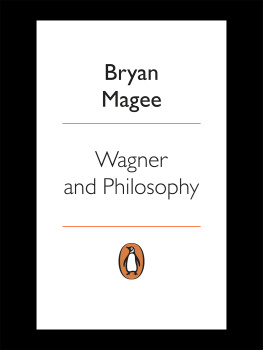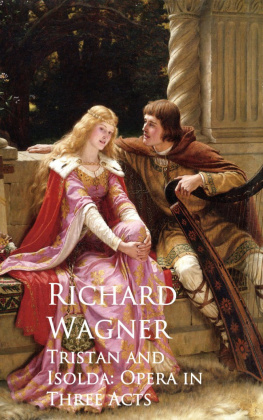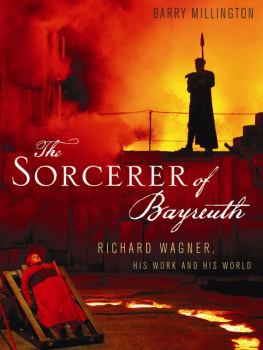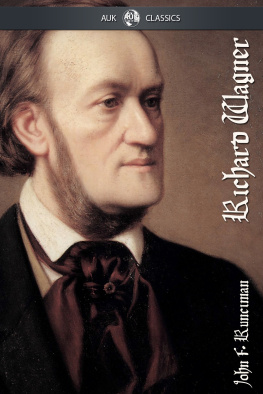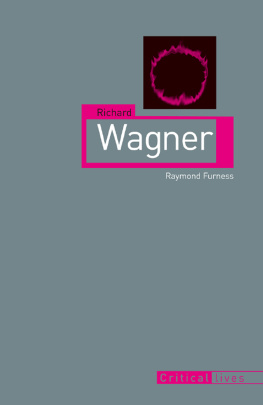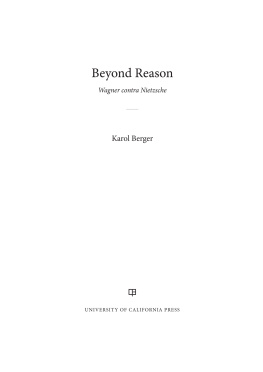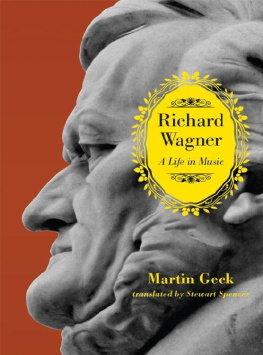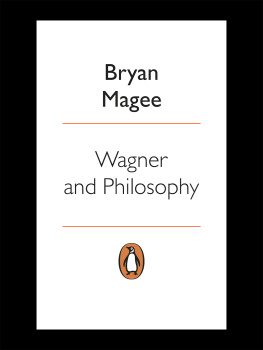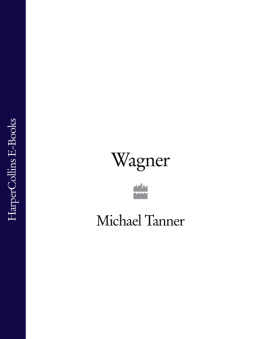EDITED BY THOMAS S. GREY
Printed on acid-free paper.
Contents
PART I
ESSAYS
From Page to Stage: Wagner as Regisseur
KATHERINE SYER
Wagner and Liszt: Elective Affinities
KENNETH HAMILTON
From Opera to Music Drama: Nominal Loss, Titular Gain
LYDIA GOEHR
Eine Kapitulation: Aristophanic Operetta as Cultural Warfare in 1870
THOMAS S. GREY
A Note on Tristans Death Wish
KAROL BERGER
Guides for Wagnerites: Leitmotifs and Wagnerian Listening
CHRISTIAN THORAU
German Jews and Wagner
LEON BOTSTEIN
PART II
BIOGRAPHICAL CONTEXTS
Wilhelmine Schrder-Devrient and Wagners Dresden
CLAIRE VON GLMER, HENRY CHORLEY
TRANSLATED, INTRODUCED, AND ANNOTATED BY THOMAS S. GREY
Catulle Mends Visits Tribschen
CATULLE MENDS
TRANSLATED, INTRODUCED, AND ANNOTATED BY THOMAS S. GREY
Recollections of Villa Wahnfried from Wagners American Dentist
NEWELL SILL JENKINS
INTRODUCED AND ANNOTATED BY THOMAS S. GREY
PART III
TOWARD A MUSIC OF THE FUTURE, 18401860
The Overture to Tannhuser
FRANZ LISZT
INTRODUCED, EDITED, AND ANNOTATED BY DAVID TRIPPETT
TRANSLATED BY JOHN SULLIVAN DWIGHT
Letters to a Young Composer About Wagner
JOHANN CHRISTIAN LOBE
INTRODUCED, EDITED, AND TRANSLATED BY DAVID TRIPPETT
Franz Brendels Reconciliation Address
FRANZ BRENDEL
INTRODUCED AND ANNOTATED BY JAMES DEAVILLE
TRANSLATED BY JAMES DEAVILLE AND MARY A. CICORA
PART IV
WAGNER AND PARIS
Wagner Admires Meyerbeer (Les Huguenots)
RICHARD WAGNER
TRANSLATED, INTRODUCED, AND ANNOTATED BY THOMAS S. GREY
Debacle at the Paris Opra:
Tannhuser and the French Critics, 1861
OSCAR COMETTANT, PAUL SCUDO
TRANSLATED BY THOMAS S. GREY
INTRODUCED BY ANNEGRET FAUSER
ANNOTATED BY ANNEGRET FAUSER AND THOMAS S. GREY
The Revue wagnrienne: Symbolism, Aestheticism
and Germanophilia
J. K. HUYSMANS, TEODOR DE WYZEWA, EDOUARD DUJARDIN
INTRODUCED BY STEVEN HUEBNER
SELECTIONS TRANSLATED BY BRENDAN KING AND CHARLOTTE MANDELL
PART V
THE BAYREUTH ERA
Press Releases from the Bayreuth Festival, 1876:
An Early Attempt at Spin Control
J. ZIMMERMANN
INTRODUCED, TRANSLATED, AND ANNOTATED BY NICHOLAS VAZSONYI
Hanslick contra Wagner:
The Ring Cycle Comes to Vienna and
Parsifal Literature
EDUARD HANSLICK
TRANSLATED, INTRODUCED, AND ANNOTATED BY THOMAS S. GREY
Hans von Wolzogens Parsifal (1887)
HANS VON WOLZOGEN
TRANSLATED, INTRODUCED, AND EDITED BY MARY A. CICORA
Cosima Wagners Bayreuth
RICHARD POHL, ARTHUR SEIDL, EUGEN GURA, ARNOLD SCHERING,
HEINRICH CHEVALLEY
TRANSLATED BY MARY A. CICORA
INTRODUCED AND ANNOTATED BY DAVID BRECKBILL
PART VI
THE COMPLETE PROGRAM NOTES OF RICHARD WAGNER
Wagner Introduces Wagner (and Beethoven):
Program Notes Written for Concert Performances by and of
Richard Wagner, 18461880
RICHARD WAGNER
TRANSLATED, ANNOTATED, AND INTRODUCED BY THOMAS S. GREY
Die Walkre
Parsifal: Prelude to Act 1
Preface and Acknowledgments
It would be difficult to point to another figure in the history of Western music who was as comprehensively involved with the larger world about him than Richard Wagner, or whose impact was felt throughout so many varied domains in his lifetime and for long after. Wagners intensive involvement in the music, the arts, and ideas of his century is witnessed in the famously vast bibliography that has grown up around him, and of course no single volume can hope to encompass the whole range of his musical and cultural legacy. That legacy seems to remain, for the time being, nearly inexhaustible, and Wagners many-faceted career provides an ideal object for a book series examining composers in the context of their life and times by means of critical essays and annotated historical documents. While the life, in Wagners case, ends in 1883, his times are interpreted more freely in this volume as extending up to or beyond the turn of the twentieth century. As with his Italian counterpart, Giuseppe Verdi, who was born in the same year (1813) and who outlived him by almost twenty years, Wagners world was that of the nineteenth century as a whole. The controversial prestige of Wagner the Gesamtknstler or total-artist reached a high-water mark with the founding of the Bayreuth Festival in 1876, which featured the premiere of the most ambitious operatic undertaking of the century, the epic tetralogy Der Ring des Nibelungen. With the quasi-sacral consecration of this festival endeavor in the premiere of Parsifal in 1882, near the end of Wagners life, the range of his cultural ambition extended even further, and for at least another quarter of a century the momentum of Wagnerism as an artistic and ideological phenomenon seemed almost unstoppable. Hence, while the material of the present volume focuses largely on the life, work, and immediate context of the composer himself, it also extends into the early twentieth century and addresses other issues of interpretation, aesthetics, and performance that are not historically delimited.
Since Wagner insisted so volubly on the larger national, indeed worldwide cultural significance of his musical dramas, conceived ultimately as a modern answer to the mythic tragedies of ancient Greece, and since he himself published on almost every conceivable subject, writing about Wagner has often tended to overlook his specifically musical achievements in favor of his broader messages and ideas. The present volume attempts to address the whole range of his activitiesmusical, theatrical, critical, polemicalwithout, of course, pretending to cover them all equally or fully. Karol Bergers Note on Tristans Death-Wish is the only essay here to address one specific work, though it does address that work as a paradigm, of sorts, of Wagners musical-dramatic enterprise generally, that is, of Wagners passionate belief in the redeeming power of the musical-dramatic work of art. Lydia Goehr, by contrast, addresses issues pertaining to the entire oeuvre through the contested question of what the works are to be calledoperas, music dramas, or something else? The concern of Wagner and his contemporaries for the naming of new genres and practices, as Goehr demonstrates, is reflected in concerns thematized by his own characters such as Lohengrin or Hans Sachs. The essay touching most directly on the actual notes of Wagners scores does so, appropriately, in a manner mediated by the world around him, specifically, through the numerous arrangements or transcriptions of Wagners music made by his friend and advocate Franz Liszt, as well as the subtler traces of a musical dialogue one might discern in the compositions of these two friends, especially in the 1850s. These Elective Affinities described by Kenneth Hamilton are reflected, too, in the influential essay on Wagners


